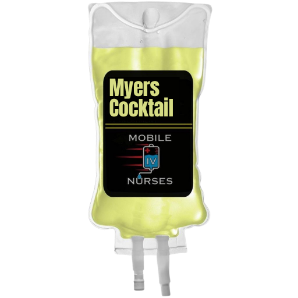
Main Types of IV Fluids
December 8, 2020
What is Vitamin B Complex?
December 28, 2020
Vitamin C, or ascorbic acid, is a water-soluble nutrient that is found in some foods we eat. In the human body, vitamin C, or ascorbic acid acts as an antioxidant, helping to protect our cells from the damage caused by free radicals.
Benefits
Vitamin C, or ascorbic acid, is a vitamin that the human body needs to build blood vessels, cartilage, muscle and collagen in bones. Vitamin C, or ascorbic acid, is also important to your body’s healing process. This makes it an essential ingredient in our IV therapy drips.
The Common Cold
For years vitamin C, or ascorbic acid, has been a popular therapy for the common cold. While some research indicates that for most people, vitamin C supplementation does not decrease the risk of getting the common cold there is data that suggests that individuals who do take vitamin C, or ascorbic acid, supplements regularly might experience shorter colds or somewhat milder symptoms when they do have a cold.
Cancer
For the past 40+ years some researchers and medical professionals have been suggesting that using high doses of intravenous vitamin C, or ascorbic acid, along with various cancer drugs could improve the overall medical management of cancer. Intravenous vitamin C, or ascorbic acid, can result in extremely high levels of vitamin C, or ascorbic acid, in the human body. Researchers and medical professionals believe that these high vitamin C, or ascorbic acid, levels can be toxic to cancer cells without harming the healthy cells of the body. There is some indication that vitamin C, or ascorbic acid, might be able to decrease some of the undesired side effects of cancer drugs.
Treatment of Viral Infections
Numerous studies have looked and the potential benefits of vitamin C, or ascorbic acid, in the management of patients with viral infections. One study outlined a therapeutic combination of hydrocortisone, ascorbic acid, and thiamine, also known as “HAT Therapy” which has also been found to work well in the medical management of patients with sepsis and septic shock. Numerous studies have noted that vitamin C, or ascorbic acid, in high dosages produces viricidal activity. This viricidal activity was explained through the formation of hydrogen peroxide and other radical initiators. Numerous studies have also recognized that vitamin C, or ascorbic acid, is a powerful antioxidant and it can exert pro-oxidant effects at high concentrations. The hypothesis is that vitamin C, or ascorbic acid may be useful in the management of viral infections through its powerful antioxidant properties as it scavenges oxygen free radicals and restores other cellular antioxidants. It is also noted that pulmonary inflammation and injury are considerably reduced by the administration of antioxidants.
Like influenza, coronaviruses are potential pandemic viruses that have the ability to injure the lungs drastically. Even before the global pandemic of Covid-19, it was determined that there is an urgent need for further innovative research to be done on the application of IV vitamin C, or ascorbic acid, that looks at targeting the medical management of infectious diseases. New studies have shown that vitamin C, or ascorbic acid, has had a beneficial effect on the medical management of these viral infections. A National Institute of Health article published in April 2020 found that a large dose of IV vitamin C, or ascorbic acid could be an effective treatment choice for Covid-19 pneumonia. Researchers believe that the onset of Acute Respiratory Distress Syndrome (ARDS) is the main mechanism for Covid-19′s action. This is followed by increased oxidative stress because of the release of free radicals and cytokines. This acute viral infection generates a “storm” of cytokines that reacts with the endothelial cells of the lung. Vitamin C, or ascorbic acid is a key compound of the antioxidant system in our cells and tissues. It is now known that both viral and bacterial infections can result in the production of excess cytokines. It is now believed that IV vitamin C, or ascorbic acid, has been effective in inhibiting the production of cytokines storm due to Covid-19. Given this information, antioxidants, such as vitamin C, or ascorbic acid, should be given to control pandemics, such as COVID-19, because of the lack of pathogen-specific vaccines and drugs. This is further strengthened by the fact that a large dose of IV vitamin C, or ascorbic acid, has shown successful clinical results in the medical management of viral ARDS and influenza.
References
https://ods.od.nih.gov/factsheets/VitaminC-Consumer/
https://www.healthline.com/health/vitamin-c-injection#benefits
https://www.mayoclinic.org/drugs-supplements-vitamin-c/art-20363932
https://www.ncbi.nlm.nih.gov/pmc/articles/PMC7172861/
FAQs
Are vitamin C and ascorbic acid the same?
Although the terms are used interchangeably, vitamin C and ascorbic acid are not exactly the same. Ascorbic acid is found in foods with vitamin C. When it comes to vitamin C tablets, the synthetic forms are composed of ascorbic acid. The natural forms of tablets (or chewables) are vitamin C.
What form of vitamin C is best?
Liposomal vitamin C has the best absorption and bioavailability properties. Taking liposomal vitamin C tablets results in the highest blood concentrations of vitamin C in any form other than IV delivery.
What happens if we take vitamin C daily?
Because the body does not make vitamin C or store it, the best way to reap its benefits is by consuming sufficient amounts of foods with vitamin C or taking vitamin C tablets daily.
Vitamin C deficiency is relatively rare. However, there are people with low levels of vitamin C who especially benefit from daily supplementation. Smoking depletes vitamin C, so smokers are at greater risk of developing a vitamin C deficiency. That’s even more likely when smokers do not eat a healthy diet consisting of lots of fruits and vegetables.
Suspect vitamin C deficiency if any of the following symptoms develop:
- Dry hair
- Easy bruising
- Gum inflammation (gingivitis)
- Scaly, dry skin
- Nosebleeds
- Increased infections
- Slow wound healing
When taken daily, vitamin C benefits include:
- Boosting immunity
- Gout prevention by reducing blood uric acid levels
- High blood pressure management
- Inflammation reduction, lessening chronic disease risk
- Iron deficiency prevention
- Less risk of developing age-related macular degeneration
- Lowered risk of cardiovascular disease, such as heart attack and stroke
- May lower the risk of dementia and memory loss
- May guard against certain cancers, including those of the skin, breast, and cervix.
Low levels of vitamin C are associated with higher odds of developing gallbladder disease, hypertension, atherosclerosis, and some cancers.
What are the side effects of ascorbic acid?
Ascorbic acid is generally safe, but some people may experience side effects. The side effects of ascorbic acid occur most often with high doses. These side effects may include:
- Bloating
- Headache
- Heartburn
- Nausea
- Stomach cramps
Taking more than 2,000mg daily increases the risk of developing kidney stones or diarrhea. If you have had a kidney stone in the past, avoid taking more than 1,000mg daily to prevent another incidence.
Keep in mind that even high doses of vitamin C do not result in toxicity but can cause gastrointestinal issues. .
Which is the strongest vitamin C?
IV vitamin C provides higher levels in the bloodstream compared to orally administered vitamin C. However, the overall strongest vitamin C is found in serums designed to help oily, dry, or acne-prone skin. As an antioxidant, vitamin C serums can combat the free radicals that break down collagen. Collagen, the most plentiful protein in the body, is responsible for keeping skin firm and elastic. Because the body produces less collagen as we age, vitamin C benefits in serum form include anti-aging properties.



